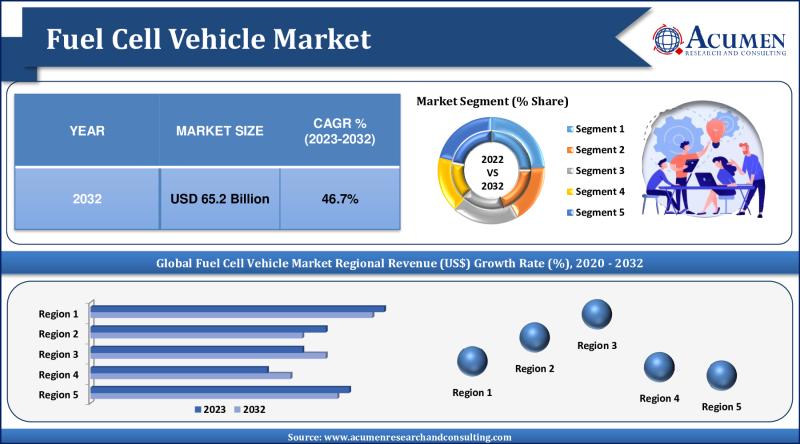Driving Towards a Green Future: Fuel Cell Vehicles Market Soars to $65.2 Billion by 2032
Key Ideas
- Rapid growth: The global Fuel Cell Vehicle Market is projected to reach USD 65.2 billion by 2032, driven by a CAGR of 46.7% from 2024 to 2032.
- Key drivers: Rising environmental awareness, technological advancements, expansion of hydrogen refueling infrastructure, and government incentives are fueling market growth.
- Market segmentation: The market is segmented by type and end-user, with North America, Europe, and Asia-Pacific leading in adoption.
- Opportunities and challenges: Despite significant opportunities from innovation and government support, challenges like high costs and limited infrastructure remain.
The global Fuel Cell Vehicle Market is on a trajectory of remarkable growth, expected to surge from USD 2.2 billion in 2023 to an impressive USD 65.2 billion by 2032, driven by a robust CAGR of 46.7%. Acumen Research and Consulting highlighted the pivotal role of fuel cell vehicles (FCVs) in sustainable transportation, offering longer ranges and faster refueling times compared to traditional electric vehicles. Factors such as rising environmental concerns, technological advancements, hydrogen infrastructure expansion, and government incentives are propelling the market forward.
Key drivers of growth include stringent emissions regulations promoting zero-emission vehicles, continuous innovation in fuel cell technology enhancing efficiency and durability, establishment of a hydrogen refueling network, and government incentives like tax breaks and subsidies. The market is segmented by vehicle type and end-user, with regions like North America, Europe, and Asia-Pacific leading in adoption and investment.
The competitive landscape features industry giants like Toyota, Hyundai, and Honda focusing on product diversification and strategic partnerships to strengthen their market presence. However, challenges such as high production costs, limited hydrogen infrastructure, and technical hurdles persist.
Despite these challenges, the future looks promising for fuel cell vehicles, with opportunities emerging from advancements in technology, increased investments, and supportive policies. The market is poised for substantial growth, offering lucrative prospects for stakeholders in the industry.
